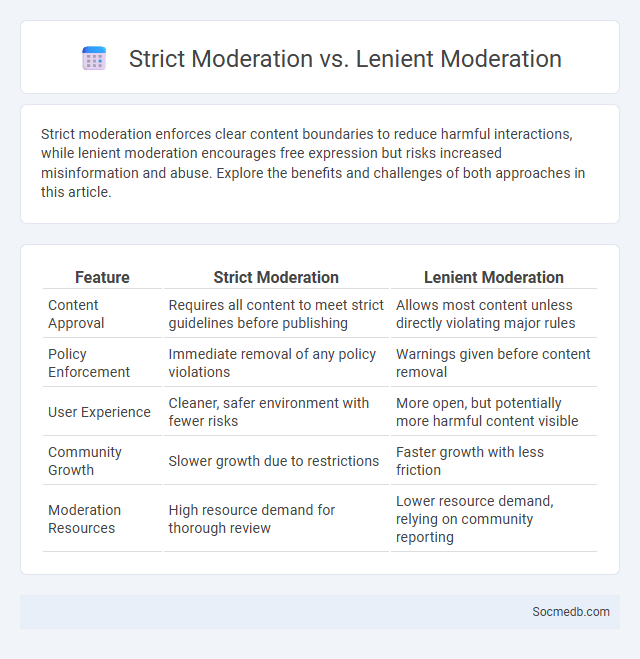
Photo illustration: Strict Moderation vs Lenient Moderation
Strict moderation enforces clear content boundaries to reduce harmful interactions, while lenient moderation encourages free expression but risks increased misinformation and abuse. Explore the benefits and challenges of both approaches in this article.
Table of Comparison
| Feature | Strict Moderation | Lenient Moderation |
|---|---|---|
| Content Approval | Requires all content to meet strict guidelines before publishing | Allows most content unless directly violating major rules |
| Policy Enforcement | Immediate removal of any policy violations | Warnings given before content removal |
| User Experience | Cleaner, safer environment with fewer risks | More open, but potentially more harmful content visible |
| Community Growth | Slower growth due to restrictions | Faster growth with less friction |
| Moderation Resources | High resource demand for thorough review | Lower resource demand, relying on community reporting |
Understanding Comment Moderation: An Overview
Comment moderation on social media platforms involves filtering and managing user-generated content to maintain a positive and safe online environment. Effective moderation uses AI algorithms and human review to detect spam, hate speech, and inappropriate language, ensuring that Your community stays engaged without exposure to harmful comments. Implementing clear guidelines and real-time monitoring enhances user trust and promotes respectful interactions across social channels.
What Is Strict Moderation?
Strict moderation in social media refers to the rigorous enforcement of platform policies to maintain a safe and respectful online environment. It involves the careful review and removal of harmful content such as hate speech, misinformation, or spam to protect users from negative experiences. By implementing strict moderation, your social media interactions remain secure, ensuring a positive and trustworthy community.
The Pros and Cons of Strict Moderation
Strict moderation on social media platforms helps maintain a safe environment by minimizing harmful content such as hate speech, misinformation, and cyberbullying, thereby promoting positive user engagement and trust. However, excessively rigid policies can suppress freedom of expression, create censorship concerns, and alienate users who feel their voices are unfairly restricted. Balancing effective moderation with transparent guidelines is essential for preserving an open yet respectful online community.
Exploring Lenient Moderation Approaches
Lenient moderation on social media platforms fosters open dialogue by allowing diverse opinions with minimal content restrictions, enhancing user engagement and community growth. Such approaches reduce censorship concerns while balancing the need to prevent harmful content through targeted enforcement of explicit violations. By prioritizing transparency and user education, lenient moderation supports a constructive online environment that values free expression and thoughtful discourse.
Benefits and Drawbacks of Lenient Moderation
Lenient social media moderation fosters open dialogue, encouraging diverse opinions and creative expression while reducing censorship concerns. Your experience may include exposure to a wider range of content, but this approach also increases the risk of harmful posts, misinformation, and toxic behavior spreading. Balancing freedom of speech with community safety remains a key challenge in platforms with relaxed content regulation policies.
Key Differences: Strict vs Lenient Moderation
Strict moderation on social media platforms involves rigorous content filtering, immediate removal of harmful or sensitive posts, and enforcement of comprehensive community guidelines to maintain a safe online environment. Lenient moderation allows more user freedom, often resulting in diverse content but can also increase exposure to misinformation, hate speech, and harmful behaviors. Platforms like Facebook typically employ strict moderation, while Twitter historically had more lenient policies, affecting user experience and platform reputation significantly.
Balancing Freedom of Speech and Community Safety
Balancing freedom of speech with community safety on social media requires implementing clear content guidelines that protect users from harmful or illegal content while preserving open dialogue. Effective moderation tools and algorithms help identify and remove hate speech, misinformation, and threats without unfairly censoring diverse opinions. Your participation in reporting inappropriate content enhances platform accountability and fosters a safer online environment for all users.
Choosing the Right Moderation Strategy for Your Platform
Selecting the right moderation strategy for your social media platform involves balancing automated AI tools with human moderators to effectively manage user-generated content. Tailoring the approach based on platform size, user demographics, and content sensitivity enhances community safety while maintaining engagement. Implementing clear guidelines and continuous monitoring ensures compliance with legal standards and fosters a positive online environment.
Impact of Moderation Style on User Engagement
Social media platforms that adopt a balanced moderation style tend to foster higher user engagement by creating a safe yet open environment for discussion. Strict moderation can deter participation by limiting expression, while lenient policies may lead to toxic interactions, reducing overall user activity. Your experience on these platforms is shaped significantly by how effectively moderation maintains respectful and meaningful interactions.
Best Practices for Effective Comment Moderation
Effective comment moderation on social media involves timely responses to user interactions, fostering positive engagement while swiftly addressing harmful content such as spam or hate speech. Utilizing automated moderation tools powered by AI helps filter inappropriate comments, ensuring community guidelines are consistently enforced. Establishing clear rules and providing transparency around moderation policies encourages respectful conversations and builds trust among followers.
 socmedb.com
socmedb.com